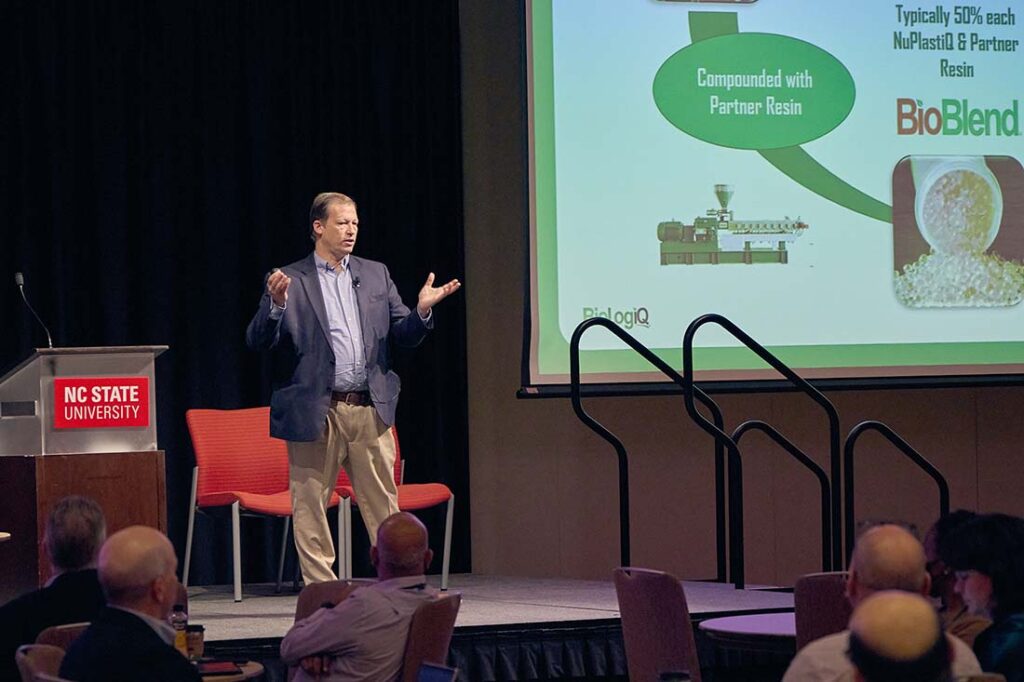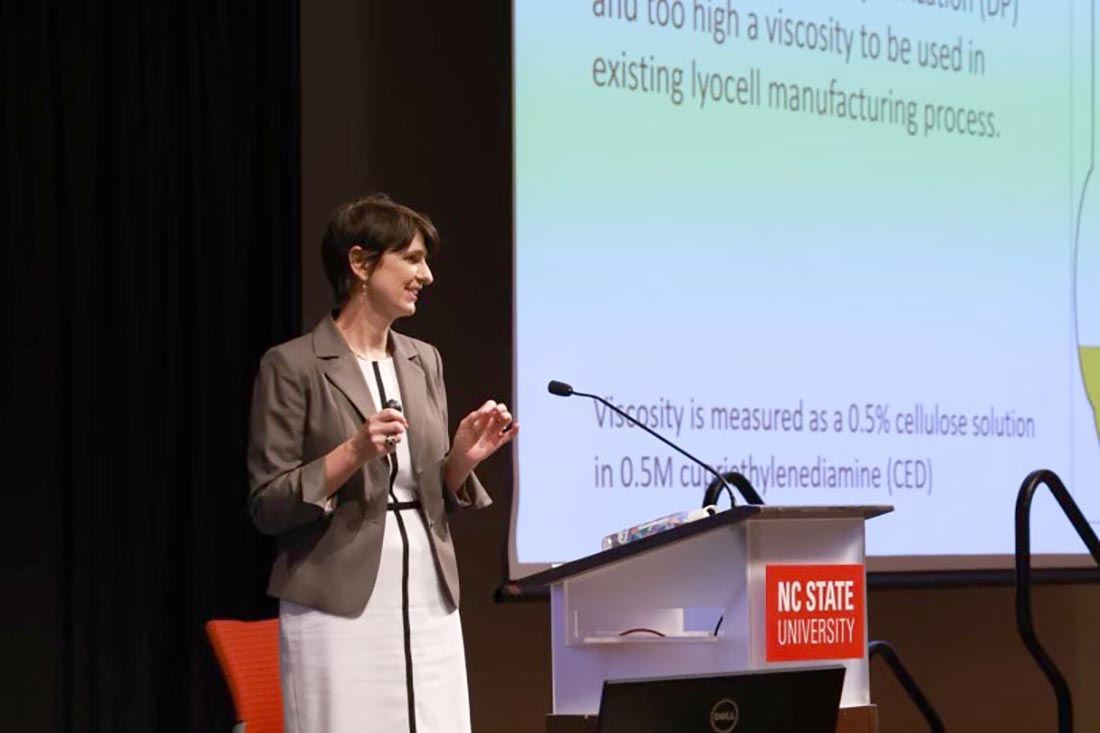In September 27-28, 2022, INDA, The Nonwoven Fabrics Association, held the RISE® Research, Innovation & Science for Engineered Fabrics Conference at North Carolina State University. Much of the conference focus was on sustainable and circular fiber and fabric options. This edition of Tech Talk will look at a selection of the paper and talks presented. The full conference proceedings are available from INDA and for more detail on individual papers, I encourage you to reach out to the presenters directly.
Before discussing specific papers, it’s worth noting that throughout the event, there was a general theme amongst presenters that there is no single answer to sustainability. It was emphasized that as new materials and end-use products are designed that sustainability and circularity should be considered for all phases of the product lifecycle. This includes choices of raw materials, the ability to reuse or upcycle, readiness to be mechanically recycled, ease of optimal chemical recycling, and failing those, then design for accelerated biodegradability.
This was poignantly seen in the choice of finalists for the RISE® Innovation Award that included sustainably sourced SERO® hemp fibers from BAST Fibre Technologies, the upcycling of diapers by DiaperRecycle to produce absorbent and flushable cat litter, and biodegradable diaper component Binder BioHook® hook and loop by Gottlieb Binder GmbH & Co KG. Together these nominees represent a holistic and multi-faceted approach to sustainability that truly captures the spirit of the RISE conference in applying fiber and nonwoven technology to address pressing issues facing the industry. Ultimately, after exceptionally tight voting, DiaperRecyle was awarded the 2022 RISE innovation award.
Dr. Behnam Pourdeyhimi of host university North Carolina State University’s Nonwovens Institute presented an overview of PLA in fiber applications with emphasis on how to optimize the use of the “King of Biopolymers” in fiber and nonwoven applications. Included in this discussion were insights into the processing-structure-property relationships of PLA, blends with augmenting polymers, PLA in bicomponent structures and optimization of PLA nonwoven bonding. Dr. Pourdeyhimi emphasized that PLA isn’t a drop-in for PP in nonwovens, but with thoughtful choice of formulation and fiber and nonwoven process conditions many satisfactory materials can be engineered and that we need to “Think of the end of life at the beginning of the product development process.”
Following Dr. Pourdeyhimi’s technical introduction to PLA in fiber and nonwoven applications were two presentations from Kristel Beckers of Total Corbion PLA and Liz Johnson, PhD of NatureWorks, LLC that highlighted molecular innovations in PLA feedstocks for fiber and nonwovens. From Total Corbion are Luminy® PLA grades for use in both core and sheath of bicomponent fibers to optimize sealability while maintaining total fabric compostability and potentially enabling self-crimping amongst other benefits. NatureWorks emphasized utilizing their Ingeo™ design toolbox to design for processability, functionality, and end-of-life. In particular, they emphasized the ability to “dial-in” compostability through choice of PLA molecular tailored grades in which the %D-Lactic Acid content is controlled.
Steven Sherman shared BioLogiQ’s starch-based biopolymers NuPlastiQ® and BioBlend® resins, which are better than CO2 neutral leaving their door. BioBlend® blended with polypropylene enables production of spunbond nonwovens competitive with 100% polypropylene nonwovens with added potential benefits of accelerated biodegradability. While biodegradation was noted as being done under “ideal conditions”, these innovations are a promising step towards enabling biodegradability of nonwoven that would otherwise not be suitable for recycling.

Switching from bio-derived polymers for fiber spinning to bio-sourced fibers, Olaf Isele presented for Trace Femcare, Inc, views on the benefits of long-neglected hemp as a fiber source. The advantages and challenges of hemp versus longtime natural fiber incumbent cotton were contrasted. Short and long-term applications for hemp fiber were discussed as well as progress in advancing standards for hemp fibers.
Going a step further, Heidi Beatty presented Nanollose™’s technology for generating fibers without either biopolymers or fiber crops. Nanollose’s patented approach converts liquid wastes into cellulose through fermentation aided by naturally occurring Acetobacter xylinum bacteria. The end product is a “tree-free” cellulose used to produce Nullarbor™ Fibre, a tree-free lyocell fiber. Chemically indistinguishable from conventional tree-derived cellulosic fibers, but potentially available in finer deniers, these fibers have potential for higher water absorbency.
Bryan Haynes of Kimberly-Clark provided a comprehensive overview of the global plastics crisis that is impacting the fiber and nonwovens industry, including challenges of plastic pollution, microplastics, and single-use plastics. Presented as well, were current material science options available to address the aforementioned issues. While presenting PHA as one of the best current options to meet the diverse requirements for adoption of a bio-plastic raw material, Dr. Haynes noted that even the “best current option” still requires a systematic solution that includes prodegradant additives and regenerated cellulose.
As Bryan noted, “Solutions need to be holistic in nature, including biodegradability and improved waste management systems. A solution can’t create another problem.” This was echoed by many of the speakers at the RISE® conference. There are no silver bullets today, only system approaches to the challenges facing the industry.
These were just a portion of the papers presented at the 2022 RISE™ conference, which also included presentations on fiber treatment, circular design for fibers and nonwovens, ultra-fine polyester fibers, deeper investigations into sustainable raw materials, and others. Paper topic submissions for RISE™ 2023 can be sent to mosickey@inda.org.
As director of education and technical affairs, Matt presents regular training related to nonwovens and filter media from INDA’s headquarters in Cary, NC. For more information about upcoming training opportunities, visit inda.org/education.


